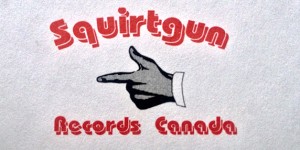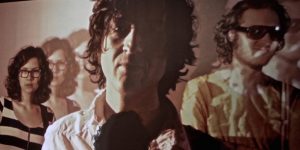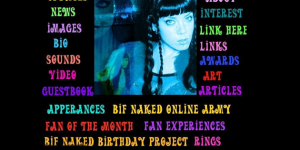By Divine Right just can't get enough Depeche Mode
by Aaron Brophy
May 27, 2016
How By Divine Right made a great rock record covering Depeche Mode's 1981 synth-pop classic, 'Speak & Spell.'
It has been argued in some quarters that, with the probable exception of the four-headed jukebox emulator known as Sloan, Toronto’s By Divine Right is the most important band in Canadian indie rock.
Led by good vibe seeker José Contreras for more than 25 years, By Divine Right just may be the original broken social scene. Indeed, BDR alumni Leslie Feist and Brendan Canning did time with Contreras long before they ever came to the actual Broken Social Scene.
When you consider that BDR’s past band lineups have also included the likes of Brian Borcherdt (Holy Fuck), Loel Campbell (Wintersleep), Rob Higgins (Dearly Beloved, Change Of Heart), Stew Heyduk (The Golden Dogs), Mitch Perkins (Rusty), most of the Meligrove Band and a whole lot more, it would be easy to mistake By Divine Right for being more a college rock finishing school than an actual *band*.
To hear Contreras tell it, that revolving door membership is a thing of the past. Current bassist Alysha “Lish” Haugen and drummer Geordie Dynes *are* the band, he says. And a profoundly unlikely source is partly responsible — British synth pop band Depeche Mode‘s 1981 debut album Speak & Spell.
Speak & Spell holds a peculiar place in the Depeche Mode canon. Mostly conceived by songwriter Vince Clarke, the album featured the hit “Just Can’t Get Enough” and is happier — and gayer — than the brooding electro-bummer dance fare the band would perfect by the late 1980s. Clarke wouldn’t be part of that success, though. After the first album he moved on to form Yazoo with Alison Moyet, and then later, Erasure.
Contreras had always wanted to reimagine Speak & Spell as a rock record and it turns out Haugen and Dynes were into the idea, too. In fact, Contreras figures that their enthusiasm (the pair also played on the last BDR album, 2013’s Organized Accidents) is helping set the direction for By Divine Right into future.
We spoke to Contreras about By Divine Right’s new album Speak & Spell U.S., his relationship to Depeche Mode and how this record compares to a Fleetwood Mac tribute.
AUX: Speak & Spell came out in 1981. How old were you then?
José Contreras: When it came out I was 11.
Was that when you discovered the record?
No, when I discovered it I was in grade nine, so 1982. I was a Depche Mode fan, kinda like a teenage Depeche Mode fan. Their third (Construction Time Again) and fourth (Some Great Reward) albums were big new wave albums in my high school.
How did you discover Speak & Spell?
I don’t remember. I just got the first record and I realized Vince Clarke was a very good songwriter. Also, I was a really big Yazoo fan. Yazoo’s probably the coolest band of all time. So I don’t remember exactly, but I always loved this record. I do remember that by ’86, ’87, which was a long time ago, the ’80s were over for me. I had moved on. I had rediscovered the ’60s and more experimental music and had started listening to college radio and that kind of stuff and I was jammin’.
If you had moved on, how did you rediscover the record?
It wasn’t for a good long time that I dipped back into my old records. But Speak & Spell was the only record I would put on unless it was purely nostalgia because it’s just a cool record, very minimalist and primitive and really different. It’s really “up” and it sounds like a snapshot of some club scene.
So I went back and rediscovered it around the ’80s revival in the ’00s. One time a friend of mine was DJing and he was like, “Put some songs on” and I put “New Life” on and immediately I noticed nobody knew what it was.
Later I gave it to Lish and Geordie and without me saying anything they were listening to it and they were, “We like this Depeche Mode record.”
I had thought to myself this would make a pretty good BDR record, I don’t know why. And they both loved the idea. We had just finished Organized Accidents and I had finished my solo record and we just jumped into it. It was also sort of the moment where we very much advanced. It’s us playing live, like, we’re a real band now. This is it. You won’t see me playing with a different line-up.
Were Depeche Mode popular in your high school?
Not really. I went to a high school where it was very much about the heavy metal guys. I don’t think they were very popular at the time. There were a few nerds who knew them. But I would have been out of high school before Music For The Masses or whatever got big. I went to a real Pink Floyd and Led Zeppelin high school. The ’70s weren’t over yet. The ’70s were still going hard.
Did the album impact your social life at all?
No. I might have met a couple of extra nerdy guys who knew it, but I was pretty shy and I was pretty shy around girls.
Do you remember where you bought the album?
I think I might have got it at Sunrise Records in (Toronto’s) Thornhill Square and it was probably like $4.99. Or I might have got it at Cheapies at Yonge and Steeles. I don’t think I would have bought that one downtown. But I did buy a 12 inch of “People Are People” in Washington, DC when I was 12 visiting my friends. I was so pumped. It was just this massive store in Washington, DC that had all these imports I had never seen before. I bought a New Order 12″. I think I bought “The Perfect Kiss.” It was insane that I would find that on vacation. I was so happy.
Was there a reason why you gravitated towards the Vince Clarke songs more than later Depeche Mode?
When you listen to the songs and the album they’re really cute. They’re really gay. It’s all about (sings from “Dreaming Of Me”) “Man. Switch. Lights. Switch” and “Hey you’re such a pretty boy.” It’s really about going out and dancing. Whereas as soon as Martin Gore starts writing the songs it’s like, “There’s a fly on the windscreen… waiting to die.” That wouldn’t have turned into a good BDR record.
It’s funny. People are, like, “It’s a Depeche Mode tribute record, right?” And I don’t know if it is. It’s like a Fleetwood Mac tribute without any of the songs from Rumors on it. It’s not a tribute record, it really isn’t. I mean, I love Speak & Spell. And I love those guys, but really I always thought it would be a fun BDR record and it was a chance for me to make this really fun garage rock record. That was my prime motivator.
Is it fair to say that doing this record helped you become a band?
Yeah, it is. It happened on Organized Accidents, there were a few moments there, but it crystalized when we’re singing together, we’re playing together and it’s impossible to do without each other. That’s different for BDR. It’s a new thing. So in a way this was a weird, lighthearted way to quickly make a record. It ended up getting complicated for personal reasons, technical reasons, life reasons for everyone and it ended up getting delayed for like a year and a half, but the thing is that even before that it had gone from kinda being a fun thing to do to us taking it very seriously.
By the time we were doing the final mixes and overdubs we were like, “This is the new BDR record and we fucking love it.” I believe in it. It’s not a joke side project. It’s like actually how to make a great rock ‘n’ roll record. How to make a great rock record in 2016? Cover a synth-pop record from the ’80s.
By Divine Right’s Speak & Spell U.S. is out now on Headless Owl Records. They will play the album on Friday, May 27 at Toronto’s Buddies In Bad Times. Beams are the opening act.





